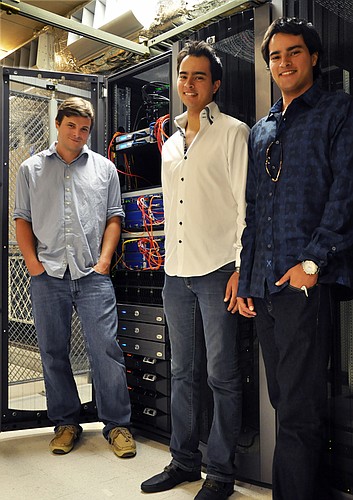- July 26, 2024
-
-
Loading

Loading

CloudVDI, a Tampa-based startup that aims to capture market share in the nascent world of cloud computing on tablets and smart phones for businesses, scored a big-time success with its first customer.
The client, which CloudVDI executives decline to name, is a Fortune 100 company that thinks so much of the firm's patent-pending products and services, it already doubled its order. “That's a significant marker in how desirable this product is,” says Rich Schineller, a Sarasota marketing executive who works with the firm. “They see the potential.”
Austin and Zach Hurst, fraternal twins in Sarasota who have launched several technology firms, co-founded CloudVDI with Tampa-based entrepreneur Ryan O'Connor earlier this year. O'Connor was previously the director of engineering at Savtira, a Tampa-based Web marketing firm that filed for bankruptcy in April.
The founders' goal: To provide a well-managed, low-cost subscription service for businesses to securely run Windows and dozens of other programs, like AutoCAD, on mobile devices and tablets. A combination of proprietary software and hardware, the CloudVDI service essentially allows an employee to work off his iPad remotely, just like he was in the office.
The CloudVDI hardware, a small box not much bigger than a deck of cards, connects to a server or the back of a computer. O'Connor and CloudVDI engineers built the software with their own network infrastructure. Each CloudVDI rack, or package, includes gear from Dell, Citrix and Juniper, the firm says.
While several companies offer similar services and products, few, if any, says Austin Hurst, marry the software and hardware like CloudVDI. The combination, the company says, provides clients the ability to host the system internally, rather than go to another server and open it up to security risks. Moreover, few companies offer the service starting at $29 a month per user, the company adds, like CloudVDI does. Some CloudVDI plans cost up to $79 a month per user.
“We wanted to make something that makes a tablet much more than a gaming device,” says Zach Hurst. “We wanted something that can run heavy business applications. We are very excited about this.”
While the Fortune 100 company is a nice prize in the early going, O'Connor maintains CloudVDI's niche will be with small and mid-sized businesses. Those clients, says O'Connor, can “implement technology virtually through CloudVDI that costs organizations millions to host themselves. Our clients are benefiting by transforming a potentially massive capital expenditure into a manageable monthly operating expense.”
The Hursts, 26, invested $50,000 of their own money into CloudVDI. The company launched the service in June, and has made about $250,000 in sales since then. “We are not trying to bring on everyone overnight,” Austin Hurst says. “We are taking it slow.”
Still, the company would eventually like to expand to other markets, past Sarasota and Tampa. Chicago and Los Angeles are two short-term goals. Says O'Connor: “We'd like to be four times the size we are now within the next four months.”
The biggest challenge, the executives say, is to get in front of enough potential clients to make consistent sales. It's a hurdle many other startups, in any industry, face. “Education is the hardest thing,” Austin Hurst says. “This isn't something you can explain over the phone.”
This story has been updated to correct the amount the Hursts invested in CloudVDI.